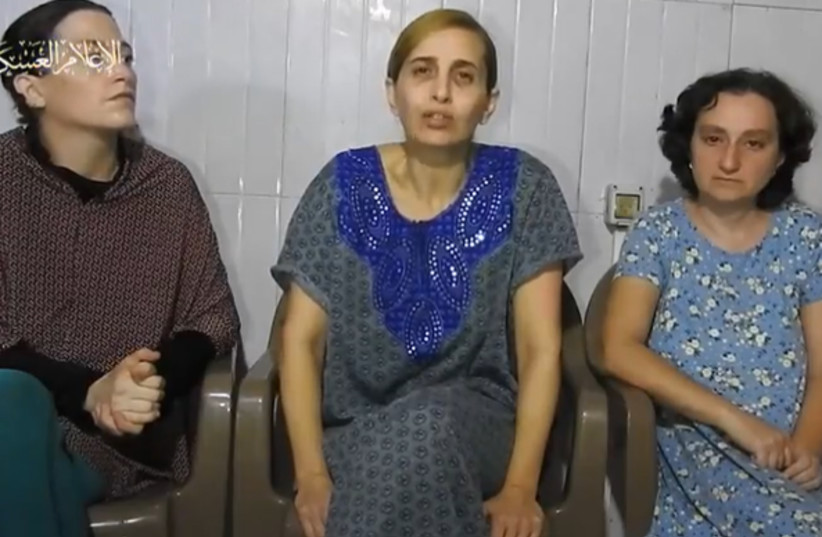On Monday, "Hamas: Theatre of War" could have claimed the top honor for Best Picture with its gripping one-minute video featuring three female hostages.
The terrorist organization released the video on its social networks two days after the families of the country's more than 230 hostages told Prime Minister Benjamin Netanyahu that "all of us here saw the tanks going into Gaza, and we are very worried." Hanas also shared it in the aftermath of Netanyahu's refusal to take responsibility for the October 7 massacre, stirring up a media frenzy.
Hamas's psychological warfare
This is precisely why the video should not have come as a surprise. It serves as yet another illustration of how Hamas strategically employs psychological warfare—a tactic that experts said the world, and especially Israel, must be cautious not to be drawn into.
"We expected that once the IDF would reach a specific point [in its war against Hamas] that we would start seeing videos of the hostages popping up with messages to stop the attacks," explained Itai Yonat, owner and CEO of Intercept 9500, which provides high-end intelligence services to corporations and state organizations worldwide.
Israeli ground forces entered Gaza over the weekend, marking what the IDF considered the next stage in its campaign against Hamas, intending to dismantle its military and political infrastructure completely.

"We were expecting a video like this to emerge within days of the ground assault," Yonat noted. "While the aerial offensive was significant, it is not as effective in pressuring Hamas as the ground offensive."
Furthermore, while Israeli media refrained from broadcasting the video, acknowledging it as a form of psychological warfare, he emphasized that for Israelis who encountered it on international news outlets or social media platforms, it should have been unmistakable that the speaker did not use the language of an Israeli citizen, irrespective of her political stance on Netanyahu.
Specifically, the hostage called on Israel to cease its ground offensive, accusing Netanyahu of wanting to use the IDF to kill them.
"We bear [the cost of] your political, security, military, and state failure on October 7," the hostage said. "Because there was no army there. No one showed up. No one protected us. And we, innocent civilians, civilians who pay taxes to the State of Israel, are in captivity under horrible conditions.
"You are killing us," she continued. "You want to kill us all? Do you want to use the IDF to kill us? Have you not slaughtered enough [people]?"
She also said to "let their people go. Let their prisoners go"—referring to Hamas.
This message echoed the sentiments expressed by Hamas.
Two weeks ago, a senior Hamas official told NBC News that they would release all civilian hostages in exchange for a cessation of IDF strikes on the Gaza Strip. Furthermore, in various statements and interviews, Hamas has articulated its intention to secure the release of all its prisoners in return for the hostages.
Weighing 'the fate of the kidnapped'
In 2011, Israel released 1,027 prisoners in exchange for a single Israeli soldier, Gilad Schalit, which included Yahya Sinwar, the mastermind behind the October 7 massacre. Hamas likely anticipates a similar outcome this time.
"Maybe someone held a gun to her head or someone else's head. Maybe she had a script," Yotam said. "We do not know."
The statements also echoed the script of the hostages, who made an unequivocal demand of the government on Saturday night to ensure the IDF's operations "weigh the fate of the kidnapped."
"We demand that no move be taken that endangers the fate of our family members and that every action takes their well-being into account," said Leshem Gonen, whose daughter Rumi was kidnapped from the music festival near Kibbutz Re'im on October 7.
And the messages played right into the debate in Israel now about the role of Netanyahu in this tragedy.
The video was reminiscent of the frail Yocheved Lifshitz, 85, who addressed the media last at Tel Aviv Sourasky Medical Center. Gaunt and exhausted, the recently released hostage told the press she had received medical care and food while in captivity.
While Lifshitz spoke from Tel Aviv, her husband remained in captivity, and one can only imagine the anxiety she felt, knowing that Hamas held her husband. In such a distressing situation, every word Lifshitz uttered had to be considered in that context.
As counterterrorism expert Lt.-Col. (res.) Dr. Anat Berko said, "Even if they did not threaten her with words, she knows they have her husband."
And Lifshitz is well aware that Hamas is closely monitoring her actions.
According to Yotam, Monday's video is unlikely to be the last of its kind.
What will the content of the following video be?
That will likely depend on the internal and external pressures Hamas faces.
